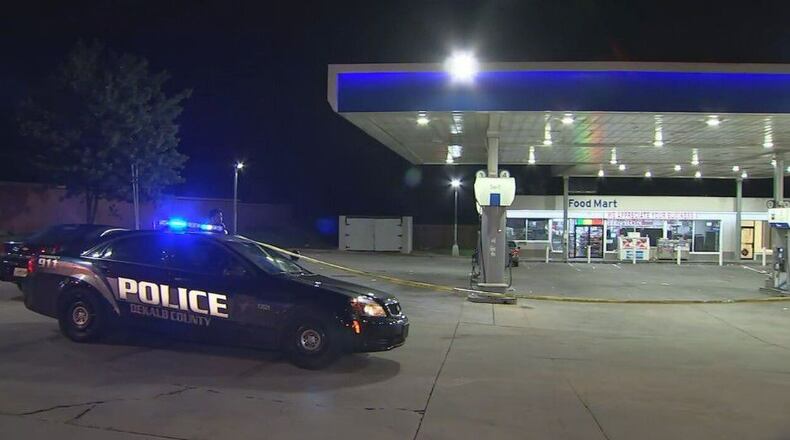Gas station and convenience store owners in DeKalb County have been slow to comply with a new video surveillance ordinance, meant to reduce violent crime.
A law requiring the stores — some of the most frequently reported sites of violent crime in the county — to install and maintain high-quality video surveillance systems went into effect over the summer. But a few months in, many only partially comply with the new rules, which require the cameras to show every pump and other areas.
Commissioner Lorraine Cochran-Johnson, who sponsored the legislation, said code enforcement officers have inspected about half of the roughly 250 stores in unincorporated DeKalb that must install the cameras. Only about 25% of those inspected are fully in compliance, but about half are close and only lack the requirement of video storage for 60 days, she said.
Cochran-Johnson said inspectors have found many gas stations are keeping recordings for 15 or 30 days.
“It does require a bit of education,” Cochran-Johnson said. “So there is a conversation.”
Cochran-Johnson started pushing for the legislation in 2020 as a way to deter and help solve crimes. Convenience stores have accounted for some of the most frequently reported sites of violent crime in DeKalb County, according to data previously obtained by The Atlanta Journal-Constitution.
When DeKalb passed its ordinance in December 2022, it was unique in the metro Atlanta area. Shortly after it went into effect on June 30, elected officials in the city of Atlanta began considering a similar ordinance.
Like in DeKalb, gas stations and convenience stores in Atlanta are the site of a disproportionate amount of violent crimes. One study found that 14% of violent crime in Atlanta from 2012-17 happened at those locations.
Similar legislation had been unsuccessful in Atlanta previously but the Atlanta City Council passed its own ordinance in August. Cochran-Johnson said two other cities in the county are considering their own legislation since the ordinance only applies to businesses in unincorporated DeKalb.
The DeKalb law requires gas stations and convenience stores to operate video surveillance 24-7. The high-resolution video cameras must record in night vision, display the date and time and record activity at registers, entrances, exits, gas pumps, loading docks and parking areas.
The ordinance also allows the police chief to impose the requirements on other businesses at which there is a high crime rate.
Cochran-Johnson and Atlanta Council member Andrea Boone, who sponsored the legislation there, have both said business owners need to play a part in helping curb crime.
“One must rise above the general call of duty because the likelihood of an incident at your facility is greater than that of other businesses,” Cochran-Johnson said. “I think that’s a small price to pay.”
In Atlanta, trade associations pushed back on the legislation, saying it’s unfair to put the responsibility for reducing crime on business owners.
The DeKalb ordinance has also sparked criticisms. The Institute for Justice, a Virginia-based civil rights law firm with a focus on protecting against unlawful searches and seizures, sent a letter to DeKalb CEO Michael Thurmond and county commissioners in October outlining its objections.
A lawyer for the group, Jared McLain, described the ordinance as “dystopian and Orwellian.”
His group shares the concerns about putting surveillance costs businesses. Additionally, McLain said the DeKalb ordinance is particularly concerning because it requires owners to turn over footage to police upon request.
“The law allows the cops to show up without a warrant and demand it under threat of fines and jail time and the loss of a business license,” he said.
McLain would like to see the county amend its ordinance so that police have to obtain consent from owners or a warrant from a judge. He also suggested the county take a carrot approach by offering businesses incentives to upgrade their security systems to comply with the new standards. A similar approach was used in Detroit and the incentives led to widespread adoption without threatening business owners’ licenses, he said.
The Institute for Justice has heard from a few business owners in DeKalb and plans to visit the county in early December to talk with more. It’s considering a legal challenge to the ordinance.
Andrew Cauthen, a spokesman for DeKalb, said county attorneys are “carefully reviewing the contentions in the letter.”
Cochran-Johnson said she thinks the Institute’s complaints are unfounded. She described the Institute as “ambulance chasers” who are looking for a legal challenge.
“If we are charged with keeping you safe, how can you feel that giving us video footage to do just that is an illegal search and seizure? That’s the most ridiculous thing I’ve heard,” she said. “I can’t believe a reasonable and prudent person would believe requesting video footage to apprehend a perpetrator amounts to an illegal search and seizure.
“Who’s side are you on?”
Cochran-Johnson said she is willing to consider some changes to the ordinance, however. In talking with businesses about the difficulty of keeping video for 60 days, as the law requires, she’s considering an amendment to make that 30 days.
“We are not here to be unreasonable but we’re also not here to bargain with safety,” she said.
About the Author
Keep Reading
The Latest
Featured



